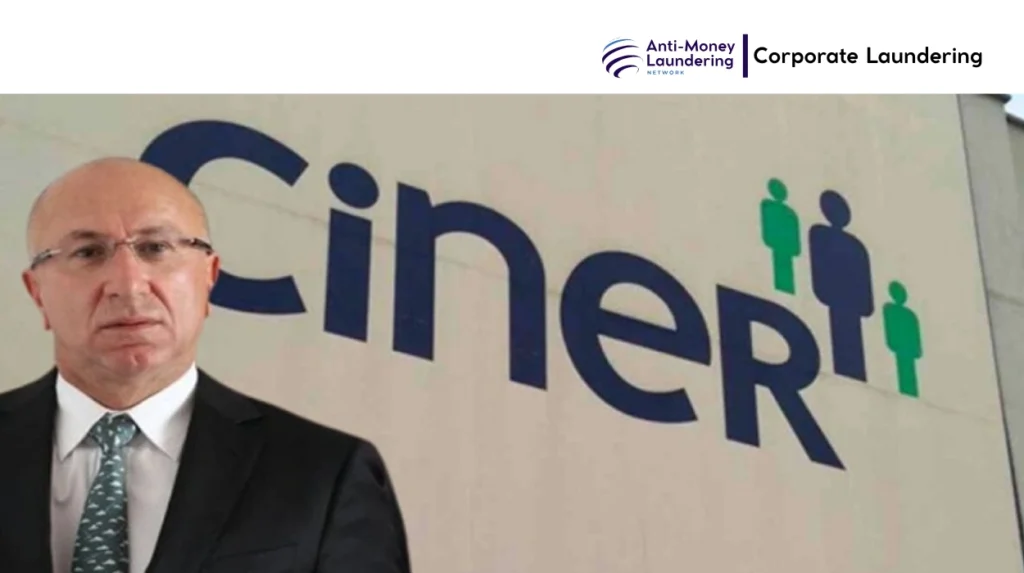Ciner Group, founded and owned by Turkish businessman Turgay Ciner, is a major conglomerate operating in various sectors including energy, mining, media, glass manufacturing, and shipping. The group has experienced rapid growth and substantial market influence both within Turkey and internationally, notably through its soda ash production and media holdings. In 2025, the conglomerate became the focus of significant legal scrutiny amid allegations of corporate laundering and financial misconduct linked to related entities such as Can Holding. These allegations have significant implications within the global Anti–Money Laundering landscape, illustrating risks posed by complex corporate structures and cross-border financial flows.
Background and Context
Before the controversy, Ciner Group was regarded as a key exporter in the natural soda ash market with diversified holdings including media assets like Habertürk and Show TV. The group’s corporate structure comprises subsidiary entities such as Park Holding A.Ş. and international branches including Ciner Wyoming LLC. Allegations emerged following a December 2024 sale of 22 companies from Ciner Holding to Can Holding, with prosecutors suspecting this transaction was used to launder criminal proceeds. Investigations accelerated in 2025 with state authorities issuing arrest warrants and seizing assets linked to both groups. This marked a turning point exposing potential systemic vulnerabilities in Turkey’s AML framework and raised international concern due to the group’s transnational operations.
Mechanisms and Laundering Channels
Evidence gathered points to a multifaceted laundering apparatus around Ciner Group, incorporating trade-based laundering, invoice fraud, and asset layering through complex networks of related companies. The use of shell companies and offshore accounts facilitated the layering of illicit funds, making detection difficult. Financial flows reportedly involved fake invoicing and manipulation of trade documentation to obscure money origins. The transfer of media assets to Can Holding was scrutinized for being a conduit of illicit financial activity, with prosecutors alleging multiple companies were created with altered boards to hinder audits and evade regulatory oversight.
Regulatory and Legal Response
Turkish regulators and law enforcement agencies launched comprehensive probes into both Ciner Group and Can Holding. Arrest warrants were issued for Turgay Ciner and several executives, with detentions and judicial seizures of over 120 affiliated companies. Courts placed Park Holding and subsidiaries under state trusteeship amid ongoing fraud, money laundering, and tax evasion allegations. The investigations highlighted compliance failures, prompting enhanced scrutiny of beneficial ownership disclosures and adherence to FATF AML recommendations. Authorities continue to examine the extent of financial misreporting and cross-border transactional layering in the Ciner network.
Financial Transparency and Global Accountability
The case illuminated critical gaps in financial transparency and regulatory enforcement, revealing how complex ownership and cross-jurisdictional entities can facilitate laundering. International regulators and financial institutions intensified their AML vigilance, leading to calls for reforms in corporate disclosure and data sharing standards. The investigation underscored the need for enhanced international cooperation to detect and disrupt similar laundering schemes embedded within conglomerates with vast market influence. It also reinforced the importance of rigorous beneficial ownership transparency and real-time asset monitoring.
Economic and Reputational Impact
The allegations and resulting legal actions have destabilized Ciner Group’s financial standing, affecting market confidence and business partnerships. With state control imposed on major subsidiaries and media assets, the group faces substantial reputational damage which impacts investor trust and complicates foreign capital access. Market disruptions extended to sectors dependent on soda ash and glass products, affecting supply chains globally. The scandal also cast a shadow over Turkey’s corporate environment, signaling heightened risk perceptions in regional and global business circles.
Governance and Compliance Lessons
The exposures in the Ciner case reveal critical governance weaknesses such as insufficient internal controls, lack of transparent audit trails, and inadequate AML compliance programs. The group’s corporate governance allowed for the obfuscation of beneficial owners and manipulation of financial flows. In response, Ciner Group and regulatory bodies have initiated reforms to strengthen internal audits, compliance risk assessments, and transparency mandates, aiming to restore corporate integrity and regulatory trust.
Legacy and Industry Implications
The Ciner Group investigations represent a watershed moment in AML enforcement in Turkey and the broader region, stressing the importance of targeting sophisticated laundering networks within large conglomerates. The case has influenced corporate ethics discourse and pushed for regulatory modernization concerning cross-sector AML compliance. It acts as a precedent for enforcing greater accountability among PEP-linked entities and exemplifies how layered corporate structures can be scrutinized under enhanced international AML cooperation frameworks.
The unfolding Ciner Group case exposes the profound challenges in combating corporate laundering within diversified conglomerates operating across borders. It highlights systemic governance and transparency failures that facilitate illicit financial flows, underscoring the necessity of robust AML enforcement and global cooperative mechanisms. The lessons learned emphasize that safeguarding the integrity of global finance requires vigilant regulatory oversight, comprehensive transparency, and corporate adherence to strong ethical and AML standards.

